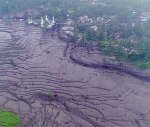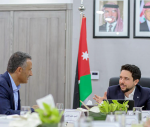You are here
Important visit
May 24,2014 - Last updated at May 24,2014
The visit of His Holiness Pope Francis to the Holy Land, including Jerusalem, sends a clear message that the fate and future of the holy sites, especially in East Jerusalem, must not be determined by the use of force, or occupation or intimidation.
The Pope is here in the area to tell the world at large, including Israel, that flouting the sanctity of the holy sites is a red line that no power must be allowed to trespass with impunity.
The Pope speaks on behalf of nearly 1.2 billion Catholics and 2.2 billion Christians, who constitute nearly a third of the world population. What he says carries serious weight across the globe.
There are already in place several international guidelines on the status of Jerusalem, including the 1947 UN partition plan for Palestine, which stipulates that Jerusalem is an international city belonging to all mankind.
Despite this international resolution, Israel occupied the city and swiftly made a claim to it in its entirety in 1947.
In 1967, the UN Security Council adopted Resolution 242 demanding Israel to end its occupation of the West Bank, including East Jerusalem.
This was also ignored by Israel.
Then came the Wadi Araba Peace Treaty between Israel and Jordan, in 1994, which provided for a specific role for Jordan as the protector and custodian of the holy sites in East Jerusalem.
His Majesty King Abdullah and Palestinian President Mahmoud Abbas reached a historic accord confirming the special role of the Hashemite dynasty in the protection of the holy places in East Jerusalem.
All these decisions fell on deaf ears in Israel.
The Israeli political establishment got used to having its way in Jerusalem and the rest of the West Bank.
The trip of the Holy See offers, therefore, another unique occasion to state, for the entire world to hear, that East Jerusalem and its holy sites cannot and must not remain under the Israeli occupation.
The Vatican stands for justice among peoples and its stance on world issues resonates widely.
The voice of the Pontiff contains elements of morality, ethics and spirituality, and commands respect and appreciation.
There is hope that this visit by the head of the Catholic Church will make a difference to the peoples of the region.
There is, therefore, reason to believe that the visit will have a lasting impact on the Middle East, especially with regard to the Israeli-Palestinian conflict, and the raging fire of destruction in Syria and Iraq.
The Pope’s prayers for peace and justice are loud and clear. But will Israel listen and hear the sermons of the Holy See from the heart of Jerusalem?












